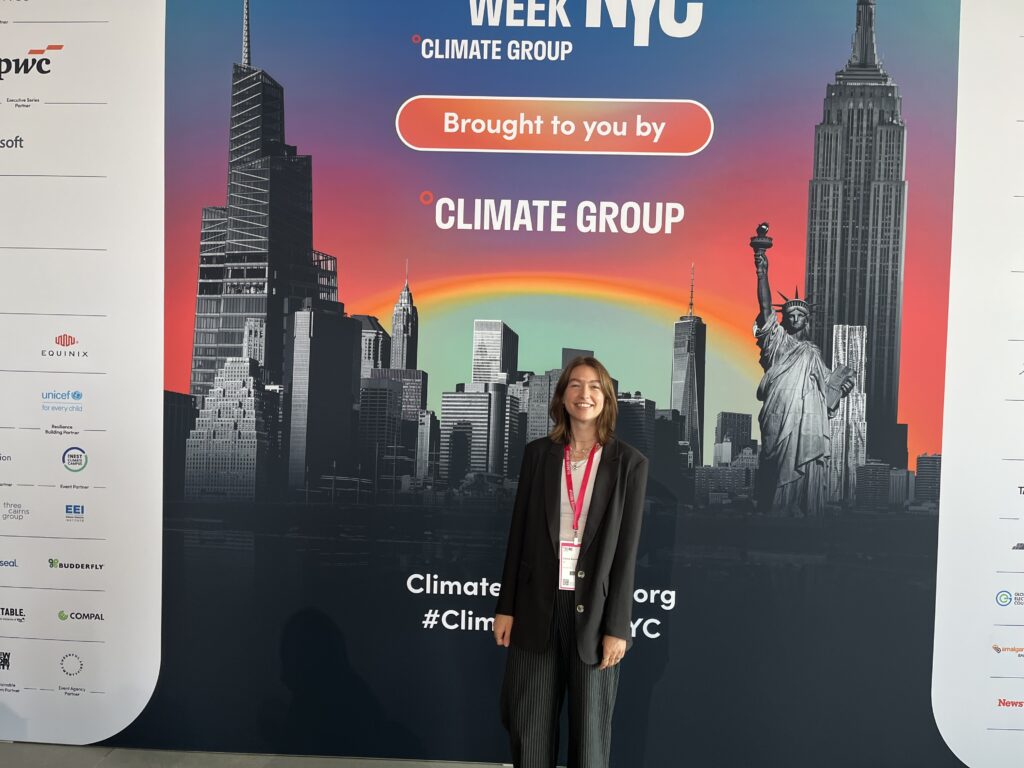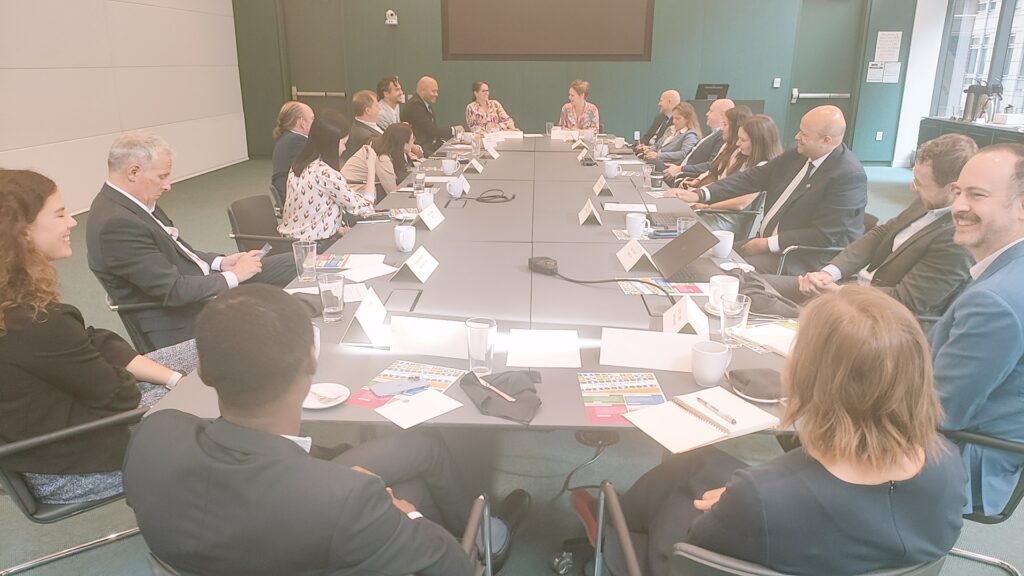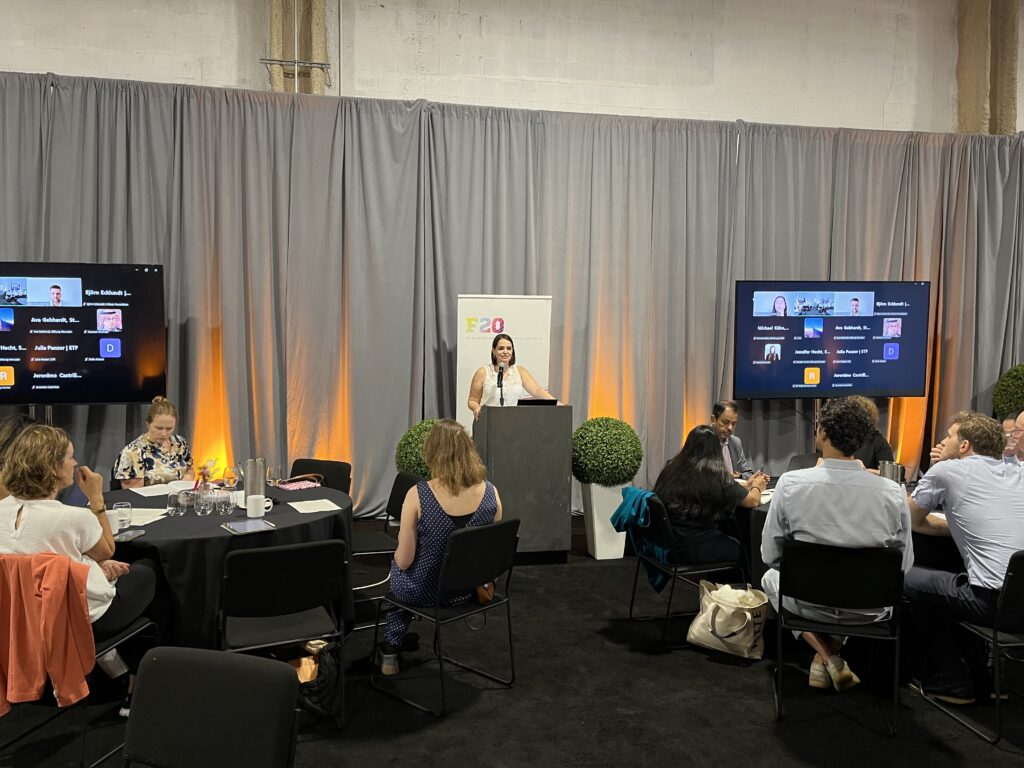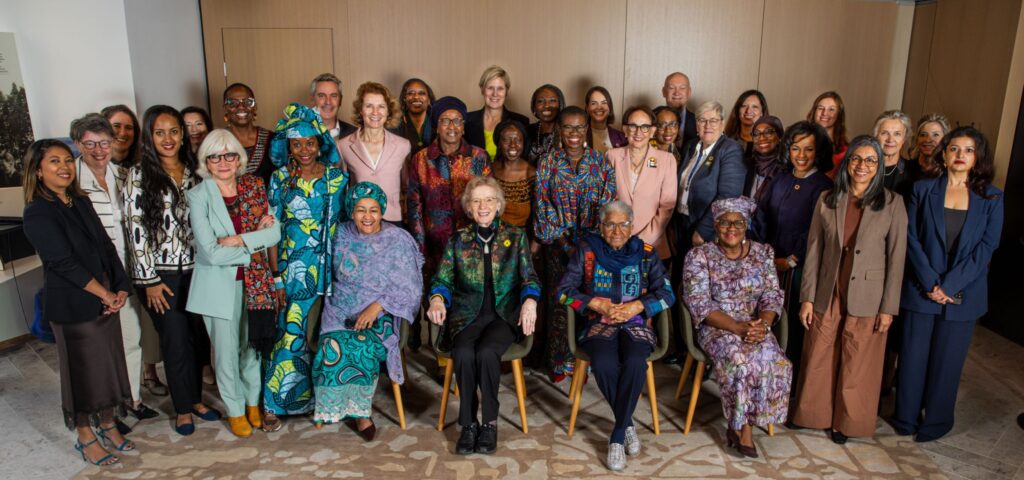This year’s New York Climate Week, the largest annual climate event of its kind, centred itself on the theme ‘Power On’. Convening governments, businesses and civil society from across the globe, New York Climate Week saw ~100,000 people gather in-person – with even more joining the discussion online. We were thrilled to see such enthusiastic engagement in a record-breaking number of events. Representing Foundations Platform F20 were Katrin Harvey, our Secretary General, alongside Celine Strufe, our Programme Manager Events and Convening. Together they attended ten partner events, took part in a dozen bilateral meetings and co-hosted four sessions.

Which events did we take part in?
- 2nd Annual In-Person Meeting of F20’s Sustainable Finance Working Group. This fruitful discussion took place at the Ban Ki-moon Foundation in New York and explored ways to lower the cost of capital for renewable energy solutions
- A Collaborative Conversation Between Climate and Education Philanthropy with IEFG. The closed-door invite-only roundtable for education and climate funders aimed to identify tangible ways in which these two groups of funders could collaborate at the climate x education nexus.
- G20 & Philanthropy Roundtable – Positioning Philanthropy within G20 Priorities: Nurturing Climate Action and Sustainable Development. Placing philanthropic action within a broad global context, this roundtable discussion spanned a wide range; from successes achieved by Brazil and South Africa to the essential nature of making sure civil society is represented in global climate action.
- SEE The Future Forum: Entrepreneurship and Coalition-Building for Global Climate Action with SEE China, WEF, Columbia Climate School. As one of the few China-focused events during NYCW, this forum was a space to reflect on current climate action and biodiversity conservation activities by Chinese stakeholders.
In all our discussions, F20 re-emphasised the importance of innovative climate finance and international financial system reform, meaningful and tangible Global South representation, the implementation of the F20 Recommendations, and the vital role of philanthropic actors in climate action and advocacy. At all F20 events, leaders and key decision makers from philanthropy, business, civil society, and the public sector were assembled with an express focus on fostering global transformative cooperation.
Several core concepts repeatedly appeared across all events, those being the importance of solidarity, collective action, intersectionality, and future-focused thinking. Some of our key takeaways from this inspiring week include:
An intersectional approach is crucial
If its aim is to be effective, philanthropy cannot operate in a silo. The actions of F20 and our network must be collective and open to learnings from new perspectives in order to maximise our positive climate impacts. This much was clear at the Climate x Education roundtable co-convened with the International Education Funders Group (IEFG), which posited that education funding without a climate lens is ineffective, and climate funding that doesn’t consider the role education plays in mitigation and adaptation will not meet its aims. Leading on from conversations connecting climate philanthropy funders with education funders in IEFG’s BIG Series, F20 reiterated the importance of learning from established networks (through existing learning journeys and thought leadership) and integrating platforms across climate and education. For those interested in the intersection of climate-education philanthropy, we invite you to read this in-depth blog written by IEFG fellow Yasmein Abdelghany.

Collective action underpins climate action
The roundtable, Positioning Philanthropy within G20 Priorities: Nurturing Climate Action and Sustainable Development, provided vital insights into where climate philanthropy is in 2025, and what actions need to be taken to ensure success in 2026. Looking at the long-term success of carry-over G20 engagement group structures, it was evident that solidarity and collective action as a unified global philanthropy community is key. Our recently published Joint Statement on Climate and Energy Democracy proves that we’re already out the gate with this, as it is a direct result of collaboration between W20, Y20, B20, U20, and F20. There is a strong and present need for new coalitions and partnerships that ensure continuity across G20 presidencies and keep momentum strong as the U.S. prepares to take on the G20 Presidency in 2026.

Accessing climate finance is just the first step
Last year’s meeting of the F20 Sustainable Finance Working Group (SFWG) at New York Climate Week agreed that the speed, scale and distribution of funds for renewable energy projects are lacking (to say the least). Since that meeting, SFWG members have convened several times and recently published a policy brief examining how the outcomes of FfD4 in Seville can help close the financing gap that leaves Africa and other low-income regions far behind in the global energy transition.
Reducing the cost of capital for renewable energy was front of mind at this year’s meeting in New York. Knowing that high costs of capital and debt burdens are restraining the energy transition, especially in the Global South, the two feasible approaches to lowering the cost of capital are; 1) challenge risk assessments, and 2) change the underlying risks. F20 is set to publish a paper detailing the realities of implementing these approaches at the end of October, so keep your eyes peeled.

Throughout the week, we also focused on strengthening and expanding our partnerships to drive greater impact across the G20 and global climate agenda. We also had meaningful discussions with the C20 and B20 engagement groups, WINGS, the Minderoo Foundation, Africa Europe Foundation, the Accountability Accelerator, Siemens Foundation, Dasra Philanthropy, Monash University, the Australian Environmental Grantmakers Network, Jain Family Institute, Resilient Cities Catalyst, WEF GAEA, European Climate Foundation, Ford Foundation, ClimateWorks, and the Ban Ki-moon Foundation, focusing on strengthening collective efforts for a just and sustainable future.
Speaking about the constant forward motion required in the climate philanthropy space, F20’s Secretary General Katrin Harvey said, “We return to our desks after New York Climate Week 2025 knowing that the need for renewed multilateralism has never been greater. The G20 offers an excellent platform for focused dialogue and collective action on our most pressing global challenges. To ensure global justice and achieve meaningful progress, we must also recognise and elevate the vital role of philanthropy as a catalyst for transformative climate action.”
Philanthropy, when strategic, inclusive, and open to learning, is critical. From capacity-building for youth and Indigenous communities, to de-risking investments, convening trusted dialogues, and building long-term relationships of trust, philanthropic organisations occupy a unique niche. One of F20’s core roles in the year ahead is to ensure that this unique space doesn’t reduce its positive effects on the climate action agenda (and hopefully grows!), while maximising opportunities for civil society to engage in climate projects and discussions that move the needle towards a climate positive future.
Q4 2025 Climate Solutions Magazine
We encourage you to read this edition of the F20 Climate Solutions Magazine in full. The articles focus on the transformative potential that future-forward, bold policy can have.
Expand the preview below and immerse yourself in these thought-provoking articles.